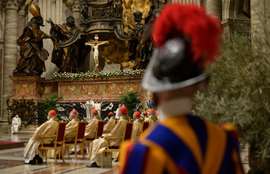
Easter Mass at St. Peter's Basilica in the Vatican
Moscow. April, 4. INTERFAX.RU – Catholics, Protestants and representatives of some other branches of Christianity on Sunday celebrate one of the main Christian holidays – Easter.
For the second year in a row, Easter has been celebrated amid the coronavirus pandemic.
Services at St. Peter's Basilica in the Vatican will begin at 11:15 am local time, everyone can follow it online. The ceremony will end with the solemn blessing of Urbi et orbi – a papal message on the occasion of the holiday.
In many European countries, which recently faced the third wave, the holiday cannot be celebrated with the whole family at one table, due to restrictive measures. For example, in Spain, the emergency regime and night curfew continue to operate, so residents of the country will not be able to visit their relatives in other regions on Easter.
German Chancellor Angela Merkel, in turn, earlier called on citizens for a “quiet Easter” in order to prevent an increase in the incidence in the country. “I beg you to refrain from all non-urgent travel,” Merkel said in her video message. Very strict restrictions on the movement of people have recently been introduced, in particular in Berlin.
In France, they urged residents of the country to abandon family gatherings on Easter holidays. However, the country's President Emmanuel Macron still allowed not to impose a strict ban on movement this weekend.
In Europe, it is traditional for schoolchildren and students to have Easter holidays at this time. For example, in Belgium, schoolchildren were originally supposed to rest from 3 to 18 April. But due to the increase in morbidity, the holidays for children began a week earlier.
In the United States, church attendance rules differ from state to state. So, in California, you can come to the service without a mask; in Missouri, places of religious worship are allowed to receive up to 35% of the maximum number of visitors. Meanwhile, in San Francisco, you need to reserve your seat online before heading to church.
In Canada, residents were advised to be vigilant and not gather in large groups. In Ottawa, which is in the “red” zone in terms of the spread of coronavirus, churches are open, but they can receive no more than 30% of parishioners, and no more than 100 people on the street. Despite this measure, most churches have announced that they will hold services online.

